
Arquivo para a ‘Politics’ Categoria
A fragile peace
Despite the ceasefire, Israel and Hamas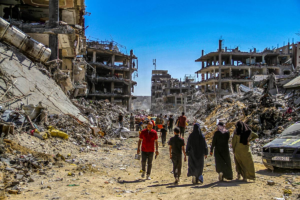 continue to exchange accusations of violating the agreement. Meanwhile, Hamas freed four female Israeli soldiers who were being held hostage (according to the Israeli government there will be 6) on Saturday 25/01, while Israel freed 200 Palestinians, 120 of whom, according to the Israeli press, are terrorists who have beheaded civilians or carried out other atrocities.
continue to exchange accusations of violating the agreement. Meanwhile, Hamas freed four female Israeli soldiers who were being held hostage (according to the Israeli government there will be 6) on Saturday 25/01, while Israel freed 200 Palestinians, 120 of whom, according to the Israeli press, are terrorists who have beheaded civilians or carried out other atrocities.
Israel has also been withdrawing part of its army from northern Gaza, but Hamas’ accusations are still preventing Palestinians from returning to the region (photo).
Ukraine is in a similar situation, where Russian soldiers are shooting at civilians who are trying to return to their homes, thus Russia is extending its occupation in eastern Ukraine, territories close to Donesk that Russia controls and claims ownership of.
Russia, according to Putin’s statement, sees the end of the war as favorable, but the situation is fragile because Russia has recruited another 150,000 soldiers, surpassing the mark of 1 million active soldiers, which is seen as disproportionate to the war in Ukraine, which has difficulties recruiting new soldiers and has an army of around 600,000.
While Trump’s new US government is talking about an immediate end to the war in Ukraine, suspicions are growing in Europe that Russia is creating conflicts in other regions of NATO, which has no more than 90,000 active military personnel, but each country has its own national army and military budgets are increasing in almost all of Europe.
In the Second World War, it should be remembered that the US only entered the war after the Japanese attack on Pearl Harbor (September 7, 1941), 2 years after the start of the war (September 1 and 2, 1939) when Germany invaded Poland.
The deportation of illegal immigrants in the US, Trump’s campaign promise, hit a new snag when Colombia rejected the extradition of their compatriots, and generated an immediate diplomatic conflict between the two countries, with economic barriers set up by the US, which were removed in the early hours of this morning (27/01) after acceptance by the deportees.
Venezuela’s borders also continue to be militarized, including with Brazil, which is not only bad for peace, but also for democracy, because the military power is growing.
The hope for peace cannot be naïve and deny the current war panorama. We need to disarm and recover the civil rights that are under threat in every corner of the planet.
Truth and justice will meet
The encounter between truth and justice still challenges most thinkers, Hans-Georg Gadamer, in his book Truth and Method, highlights the two points that are still obstacles to this dichotomy: “The effective exemplarity that the new mechanics had and its triumph for The sciences of the 18th century, highlighted by Newton’s celestial mechanics, continued to be so evident to Helmholtz that he was far from asking what philosophical preconditions had enabled the emergence of this new science in the 18th century. XVII” (Gadamer, 1997, p. 42), and points this out as a result of the Occamist School of Paris.
challenges most thinkers, Hans-Georg Gadamer, in his book Truth and Method, highlights the two points that are still obstacles to this dichotomy: “The effective exemplarity that the new mechanics had and its triumph for The sciences of the 18th century, highlighted by Newton’s celestial mechanics, continued to be so evident to Helmholtz that he was far from asking what philosophical preconditions had enabled the emergence of this new science in the 18th century. XVII” (Gadamer, 1997, p. 42), and points this out as a result of the Occamist School of Paris.
Wiliam Ockham (1276-1347) was a Scottish monk who established the principle of “Ockham’s Razor” which says that between two explanations you should take the more and this reached the studies of the 17th and 18th centuries, and Helmholtz was the one who tried to separate the sciences of nature from their historical derivation, because this way the sciences of the spirit could be worked on.
Gadamer has the merit of unveiling (it is not the unveiling that would be reaching the Truth), when analyzing Dilthey’s historical romanticism: “with regard to this independence of the methods of the sciences of the spirit, Dilthey continues to link it to the ancient “Natura parendo vincitur” “ (Gadamer, 1997, p. 44) and thus Newtonian principles continued to prevail in the “Sciences of the Spirit” and thus the true bases of these sciences remain linked to logicism.
The meaning of the Latin term is “Nature is overcome when giving birth”, it links the natural to the supernatural, and thus ends up denying it, this was Kant’s intention (sapere audi, to dare to know) and which became enshrined in modernity by Hegel: “the real is only an aspect of the ideal”.
In idealism there is no concept of virtue (areté), but of training as a personal discipline, Wilhelm Von Humboldt corrected this: “When we, however, in our language say training, we are referring to something at the same time more intimate , that is, to the nature that comes from the knowledge and feeling of the set of spiritual and moral commitment, to spill harmoniously into sensitivity and character” (Gadamer, 1997, p. 49).
Thus, modernity abolished metaphysics, what is beyond physis (since the Greeks means nature) and the supernatural (that which is above nature, the superno natura).
Thus, in a reductionism of truth, when we seek justice we think it is correct to use half-truths (the means justify the ends) and when we say we defend the Truth, we think it is correct to suppress conditions of human and divine justice to defend it, there is a link between them Justice without Truth is mutilated, Truth without Justice is half-truth
GADAMER, H.G. (1997) Verdade e método. Trad.de Flávio Paulo Meurer. Brazil: Petrópolis, RJ: Vozes.
Difficulties and possible peace
On Sunday morning, Israel again bombed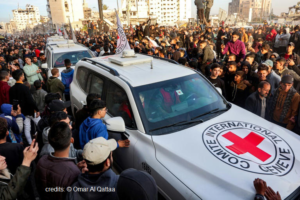 the north of the Gaza Strip, killing 8 people, due to the delay in handing over the list of hostages, Hamas admitted the delay “for technical reasons” but ratified the agreement, and issued the note: “As part of the prisoner exchange agreement, we decided to release today: Romi Gonen, 24, Emily Damari, 28, and Doron Shtanbar Khair, 31,” said Abu Obeida, Hamas spokesman.
the north of the Gaza Strip, killing 8 people, due to the delay in handing over the list of hostages, Hamas admitted the delay “for technical reasons” but ratified the agreement, and issued the note: “As part of the prisoner exchange agreement, we decided to release today: Romi Gonen, 24, Emily Damari, 28, and Doron Shtanbar Khair, 31,” said Abu Obeida, Hamas spokesman.
The three hostages released will be accompanied by IDF (army) and ISA (security) forces on their return to Israeli territory, where they will undergo an initial medical evaluation.” The hostages were held for 471 days.
The hostages were handed over to the Red Cross (photo) and sent to Israel. There are still two more stages before the agreement is fulfilled, according to several experts (such as Rubens de Siqueira Duarte, a professor in the Postgraduate Program in Military Sciences at the Army’s Command and Staff School in Brazil) it is an important step, but peace is still uncertain.
The stages are important because the path of (historical) mistrust must be overcome carefully and with goodwill on both sides, and we are now waiting for the prisoners who are Hamas militants to be released.
On the other dangerous front in Eastern Europe, Trump’s inauguration today, and the war weariness that is already present on both sides, could hasten a ceasefire, where the forces involved may prove more resistant, because they involve territorial issues that are difficult to negotiate (Russia already dominates 30% of Ukrainian territory, which only has the Kursk region taken from the Russians).
It is believed that Trump should stop supporting Ukraine and then it would be forced, in his nationalist logic that they should get involved in “America first” issues, but threats to Greenland and Canada are unacceptable for world peace.
Any agreement must also, as in the Hamas/Israel case, have bilateral concessions.
Peace is desirable, the ceasefire is a step, but to be lasting it must have fundamental aspects of peoples’ rights and humanitarian conditions respected.
Urgent: Israeli cabinet approves peace agreement
Israel’s cabinet of ministers has voted in favor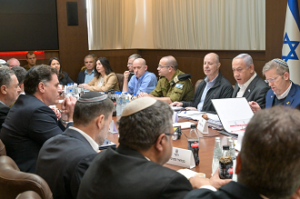 of a ceasefire that will come into effect on Sunday, will initially last 42 days, provides for the phased return of hostages and Israel’s gradual withdrawal from the Gaza Strip.
of a ceasefire that will come into effect on Sunday, will initially last 42 days, provides for the phased return of hostages and Israel’s gradual withdrawal from the Gaza Strip.
According to the Times of Israel, 24 ministers voted in favor, while eight voted against approval, Communications Minister Shlomo Karhi did not attend, the note says: “the government approved the framework for the return of hostages”.
Qatari Prime Minister Sheik Mohammed bin Abdulraham al Thani, who mediated the agreement, stated the “need for both parties to commit to the implementation of all phases of the agreement” to avoid “civilian bloodshed”, the details of the second and third phases will be known after the implementation of the first phase.
May this peace spread to other regions in conflict and serious threats from imperial forces.
Peace or truce in the Middle East ?
A peace agreement has been celebrated in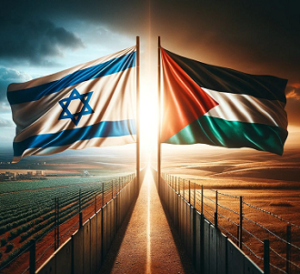 the Middle East, but there are still doubts about the real conditions of this agreement, as bad agreements only postpone hatreds and reorganize forces.
the Middle East, but there are still doubts about the real conditions of this agreement, as bad agreements only postpone hatreds and reorganize forces.
A ceasefire agreement only means a new military balance in the region, according to Israeli Prime Minister Binyamin Netanyahu, in practice with the United States calling the shots in the region and a retreat by Iran, the fall of a long dictatorship in Syria has contributed to this, but there will be peace without the reconstruction of humanitarian conditions in the region and in Yemen.
Before the October 7 attack by Hamas on Israeli territory, Iran was calling the shots in the region, including well-trained terrorists in the Gaza Strip, where Palestinians live under constant hostility from Israel, and this escalated after October 7.
We need to restore humanitarian conditions in the region, and understand that poverty in Yemen is one of the worst in the world, so a truce is not enough, we need to get to the root of the war.
In more than 40 years, few agreements have been successful and the crisis continues in the region. Since the Six Day War in 1967, agreements signed between Israel and Egypt, between Israel and Jordan, the central issue between Palestinians and Israelis has not been resolved, a direct agreement is needed.
The agreement, officially announced in Qatar by Prime Minister Mohammed bin Abdulrahman Al Thani, was reached between Hamas and Israeli negotiators, which is a good start because it is direct between the parties.
His words, “hopefully, this will be the last page,” are very significant, but one cannot underestimate the conditions in the medium and long term, in other words, re-establishing humanitarian conditions in the region and not thinking of Yemen as a separate chapter, it’s Houthis’ headquarters, they attacked a “vital” post in Israel yesterday, before the agreement.
Regarding the hostages who are due to be released soon, of the 251 captured by Hamas on October 7, 2023, 94 are believed to be still in Gaza, 60 are alive and 34 are dead.
It is now necessary to disarm the warring spirits, not only in the region, but throughout the planet.
Urgent: According to the Associated Press, Israel’s cabinet has not yet ratified the agreement, says Hamas has imposed “new” concessions: “The cabinet will not meet until the mediators notify Israel that Hamas has accepted all the items in the agreement,” said Netanyahu, fight, pray or think positive for PEACE.
Dostoevsky and the war
Imagining that all Russian literature is Soviet is,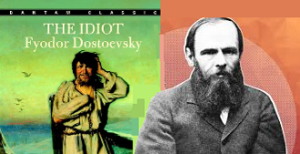 above all, ahistorical because great masters of literature predate the Soviet period: Fyodor Dostoevsky (1821-1881), Anton Chekhov (1860-1904) and Leon Tostoy (1828-1910), not to mention Gogol, Pushkin and others.
above all, ahistorical because great masters of literature predate the Soviet period: Fyodor Dostoevsky (1821-1881), Anton Chekhov (1860-1904) and Leon Tostoy (1828-1910), not to mention Gogol, Pushkin and others.
Dostoevsky was a master at exploring ethical and spiritual issues in his characters, he also addresses issues of faith, redemption and the search for truth.
Dostoevsky was imprisoned for political reasons, his style of literature was realistic, but from a philosophical point of view, to give a more precise connotation, he was an existentialist, his anti-tsar ideas (the Russian monarchy) make many interpreters place him as a “revolutionary”.
Dostoievsky belonged to a group known as the Petrashevsky Circle, despite being from different currents, they were mostly progressive and wanted the end of Russian feudalism.
Among his best-known works are: The Brothers Karamazov, The Idiot and Crime and Punishment, although they are ethical and existentialist dramas, there is within these works the ideal of pan-Slavism, an ideal of unity between all Orthodox Christian and Slavic nations and in this sense, they were conservative, as other currents defended integration into Europe.
The Idiot was a novel that began in September 1867 when the author was in Geneva and concluded in January 1869 in the city of Florence. This alone would indicate its universal character and with themes that go beyond the literary and political scope.
The Idiot tells the story of the young Prince Myshkin who, after several years in a sanatorium in Switzerland, returns to Russia and comes across a world mired in indolence and material life.
Contrary to the title, the character seen by many as an idiot for refusing values and the spirit of indolence by returning to his country, feels like an idiot to a certain extent, but teaches us that it is possible to live outside the unethical and immoral standards of the world. your time.
The character resolves to be courteous and sincere in a corrupted world and the author writes about him: “No one should expect more than this from me. Maybe here they also look at me like a child; It’s okay” and adds: “But can I be an idiot now, if I feel able to see, for myself, that everyone takes me for an idiot? When I arrived, I thought: “I know they take me for an idiot; However, I have discernment and they don’t realize it!…”.
So the Russian drama of experiencing pan-Slavism or integration into the West was already present.
Witnessing and acting in peace
It may seem that peace, seen as a new way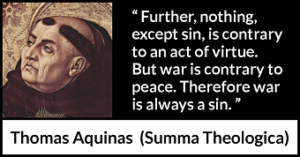 of thinking about personal and social relationships, is something intimate or purely “interior” (it is a complement to exteriority), but it is not, because it is possible to act according to this peace that is different from that conceived as only human.
of thinking about personal and social relationships, is something intimate or purely “interior” (it is a complement to exteriority), but it is not, because it is possible to act according to this peace that is different from that conceived as only human.
This inner peace, which is not what we developed in the previous post, is not what the Greeks called ataxia, peace of mind free from fear, nor aponia, absence of pain, which would be the ideal states of life; pain and fear do exist, especially at times of crisis.
In fact, it is this bad relationship with pain and fear that makes society sink deeper into its crisis, the pursuit of pleasure without measure and the absence of fear in daily attitudes and actions that are contrary to peace in the world; wars begin with small actions of hatred.
Committing to peace, in the realm of truth, can even put your life at risk, as Thomas Aquinas says: “Whoever tells the truth loses friendships”, but it must be said that his truth is not logical but onto-logical, in other words, it follows a logic of Being.
In previous posts, we returned to the question of the cardinal virtues, pointed out in particular by Philippa Foot (English philosopher). In Thomas Aquinas, we find the connection between peace and these virtues: justice, wisdom, prudence and charity. For the Aquinate, peace is achieved in the midst of men if these virtues help to produce the peace desired by humanity.
Thomas Aquinas also understands peace in a broader sense: “peace is the tranquillity of manner, of species and of order” (Aquinas, 2019) (It is worth noting that by order, we mean that each thing is in its proper place).
Thus, along with the virtues of justice, wisdom and prudence, there must be the bond of charity, which is not simply worldly love or appreciation. Charity not only unifies the appetites of individuals, it also leads each man to love his neighbor as himself, that is, to want to fulfill the desires and needs of his neighbor as if they were his own.
The Angelic Doctor says: “Peace is nothing other than the unity of affections, which is proper to God alone, because it is through charity – which only comes from God – that hearts are united. In fact, God knows how to bring together and unite, because God is Love, which is the bond of perfection” (Aquinas 2019).
So this desired peace depends on more than divine love, putting it into practice in our lives and in our daily lives, illuminating conflicting relationships with concord and unity.
SANTO TOMAS DE AQUINO. Corpus Thomisticum. [S. l.]: Fundação Tomás de Aquino, 2019. Available in: http://www.corpusthomisticum.org, access: december 2024.
The real chances of peace in 2025
A 2024 assessment of the war is disastrous: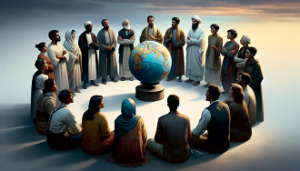 the conflict that has broken out in Gaza, with Israeli forces invading that territory and carrying out actions that are reprehensible for their acts of cruelty and difficulties in accessing international aid organizations, the increase in the conflict in Eastern Europe, now also with aggressions on Russian territory and China’s threats against Taiwan paint a very sad and worrying picture.
the conflict that has broken out in Gaza, with Israeli forces invading that territory and carrying out actions that are reprehensible for their acts of cruelty and difficulties in accessing international aid organizations, the increase in the conflict in Eastern Europe, now also with aggressions on Russian territory and China’s threats against Taiwan paint a very sad and worrying picture.
The American government-elect that takes office in January, Donald Trump, has promised to put an immediate end to the war. The problem is that the 4 provinces dominated by Russia by force: Donetsk, Luhansk, Zaporizhzhia and Kherson, are not in question, although Russia says that “some border adjustments” are possible, and demands that Ukraine be left out of NATO.
Russia would thus gain 18% of Ukraine’s territory, but fears that a “ceasefire” agreement is just a way for Ukraine to take a breather and rearm; if the current escalation continues, greater involvement by European nations could make the conflict off-limits to negotiations.
The other worrying pole is the escalation of the war in the Middle East. Israel is not backing down from its pretensions to eliminate its enemies in the region, but it is doing so outside humanitarian limits and what is considered abominable, even though the war is already a humanitarian disaster, the bombing of schools, hospitals, the last one that was functioning precariously also seems to be out of operation in Gaza, goes beyond the limit and to the point of being an abomination, Even if we know that war is already a humanitarian disaster, the bombing of schools and hospitals, the last of which, which was functioning precariously, also seems to be out of operation in Gaza, goes beyond the limit and makes those responsible guilty of a war crime, of course, the terrorism atack in october 7th in Israel its crime too.
There are reasons to consider peace, yes, because it creates global tension, weakens the economy and affects the most vulnerable peoples, bringing more misery and hunger. Strictly speaking, it shouldn’t interest anyone, but there is a tragic reasoning behind wars, which is to know “if my enemy has lost more”, since everyone loses, and the most fragile are the first to be hit.
The world is polarized, even those who should be the most ardent defenders of peace have given themselves over to the bipolar game of hating the enemy, without the possibility of dialogue or understanding a different point of view, everyone says “this is unreasonable”.
So we frantically search social media for those judgments and hatreds that favor us, without realizing that we have become influenced by this bipolarity and this hostile climate between peoples, political positions and a rational dialogue about their positions and ideas.
There is always hope for a renewal of the civilizing process, but at the moment it seems stuck and regressing to absurd levels of education, health, culture, politics and even spirituality, which has become a business and without any exercise in analyzing the heritage on which most religions were built: solidarity, helping the vulnerable, greater social balance and environments of truly spiritual values and virtues.
Christmas and peace
In the midst of wars and hatreds, it is possible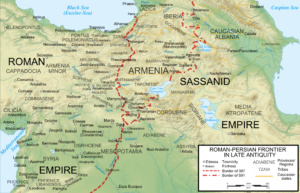 to find peace ? and what peace we are talking about.
to find peace ? and what peace we are talking about.
The roman´s pax was the rule of the Roman Empire over nations and territories, Kant’s eternal peace, although it has something to commend it when it talks about peace for all, in reality the idea was born out of the peace between the Byzantine Empire and the Sassanid Empire (see map), a treaty of indefinite duration, which concluded the Iberian War (527-531) between two imperial powers.
There was also a religious peace, called the Peace of Westphalia, where the agreement between Catholics and Lutherans took place, as there were kingdoms declaring war over religion.
The peace of Christmas, even if it is paganized, is that which the birth of Jesus promised to bring among men, of which he said: “Peace I leave with you, my peace I give to you. I do not give it as the world gives it. Let not your heart be troubled, neither let it be afraid” (Jn 14:27).
Yes, we are promoters of wars in our midst, between family members, between work colleagues, we don’t accept opinions and worldviews that differ from our own, we may not use weapons, but by spreading hatred and exclusion we are seeking a peace that has nothing divine about it, it’s just “our peace”, and there is no shortage of oratory and speeches asking us to ignore the Other.
So what kind of peace should we be thinking about at Christmas? The vast majority of people probably haven’t even heard of the Iberian War, nor of one of the empires involved, the Sassanids.
We see a world in imperial wars, everyone wants to colonize or eliminate their neighbor.
So the “imperial” wars we are involved in, even if it’s as a “cheer”, in the distant future will be seen as a period of atrocities and unjustifiable disputes. Of course, today the arguments seem plausible, there is no shortage of narratives to justify so much death and hatred, but they will not be eternal and there is nothing divine about them, even if religious people get involved in these worldly disputes.
The peace of Christmas transcends all this, it must proclaim more than a truce, a laying down of arms, the end of hatreds and grudges, and this peace that Jesus came to bring to the world.
Between peace and satiety
The society of fatigue is one that seeks maximum performance, maximum voluptuousness and maximum consumption. It does not lead to peace or happiness, but to stress, depression and, for a large part of the population, exclusion, hunger and misery.
performance, maximum voluptuousness and maximum consumption. It does not lead to peace or happiness, but to stress, depression and, for a large part of the population, exclusion, hunger and misery.
And the peace and “satisfaction” that everyone seeks is not found in exaggerated attitudes of consumption and efficiency, but in that inner wisdom that seeks understanding, love and balance in actions and words, the true peace that every sane man seeks.
Athens was a model of wisdom and wealth, Sparta a model of military discipline and bravery.
A little-known event in history is the Peace of Nicias, an agreement between the Greek cities of Athens and Sparta in 421 BC, establishing a truce between the cities for 50 years, but in 414 BC the agreement was broken and the Peloponnesian War broke out.
Athens possessed the wealth of silver mines and Sparta was famous for its preparation for war. Any coincidence with today’s empires is no coincidence, Athens joined forces with the city of Argos, Sparta’s rival, but they lost the war, and in 405 BC King Pausanias of Sparta ordered the siege of Athens and the starving and exhausted population surrendered.
So models based solely on “wisdom” or “war” are both bankrupt, what is lacking is a spirit of true conciliation between peoples and tolerance between cultures.
The Macedonian and Roman empires also came to an end, so no matter how armed and prepared today’s nations and countries are, it won’t be through arms that they will be able to overcome their enemies.
Fortuna, the Roman goddess of chance, luck and destiny, was blindfolded (like modern justice), because she distributed human plans randomly, so you are happy at random.
Thus, models based solely on “wisdom” or “war” are both bankrupt; what is lacking is a spirit of true conciliation between peoples and tolerance between cultures.
The Macedonian and Roman empires also came to an end, so no matter how armed and prepared today’s nations and countries are, it won’t be through arms that they will achieve “well-being”.
The growth of a greater spirit of understanding and solidarity, which goes beyond the merely logical criteria of reason and wisdom, is the only way to create a climate of peace and satiety.
The fact that many people today seek satiety in drink, food, drugs and other escapes is because we have not yet entered a Civilization of Love, Peace and the solution of social crises.

